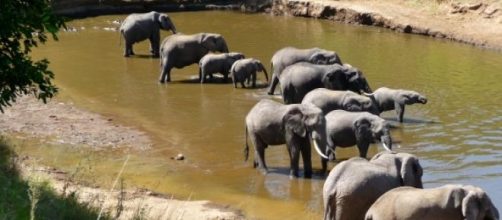Backin 2008 I visited Lac Manyara National park in Tanzania. I was fortunate to spenda wonderful time staring at a wide variety of wildlife that inhabits the parkwhich consists of 330 km2.It was my first time to see an elephant face to face apart from watching themon TV.
Thatwas an awesome experience to be near the largest of all land animals. I was impressedby how they are humble and harmless. They don`t care about people being aroundthem and just keep on grazing. One cannot fail to fell attached to them by thekind of peace that reigns in their surroundings.
UnfortunatelyI have been coming across reports indicating that the beloved creatures are onthe verge of extinction because of poaching activities. Elephants are beingregularly killed in Africa because of their ivory that is in high demand inChina and elsewhere in Asia.
Thoughthey are harmless, elephants are slaughtered by poachers in a most dramatic way. Itis reported that in 2012 hundreds of elephants were killed using automaticweapons in Bouba Ndjidah National Park in Cameron. Poachers have gone as faras hunting them by using poisonous arrows just to make sure that they get theirprecious tusks.
Anarticle that was published in National Geographic last year reported that morethan 100,000 African elephants were killed between 2010 and 2012.
That is roughlyone of every twelve African elephants.
Accordingto a new study by ivory researchers, the prices of their ivory has tripled overthe last four years in China, the world`s biggest market. After touringhundreds of Chinese retail outlets and factories in May last year, ivoryexperts Esmond Martin and Lucy Vigne found out that ivory average prices were US$ 2100 per kilogram. In 2010 ivory prices were estimated at US$ 750 in the same market.
Coloradostate university researchers estimate that in 1979, elephants numbered 1.3million in Africa but in 2007 their number had fallen to between 472,000 and690,000. This is a tragic situation whereby a half of their population wasdecimated in just two decades.
Elephantsare one of the wildlife that attracts millions of visitors to Africa. Touriststravel thousands of miles to just contemplateand experience the emotion of being around the largest animal in the world.
Willthey be able to do so in a half century? I doubt it will be possible if currenttrends of elephants poaching keep on going. The end result is that our planetwill lose genetic diversity they are contributing on the African continent.
GeorgeWittemyer of Colorado University was quoted in National Geographic saying thatelephants are keystone species as they balance all the other species in theecosystem. He noted that they open up forest land to create firebreaks andgrasslands, digging to create water access for other animals, and livingnutrients in their wake.
Elephants are essentially playing a key role todisseminate seeds that maintain tree diversity.
Internationalconvention between governments such as CITES were put in place to halt this trend. But I doubt ifthis will be enough due to the rising demand of ivory, mainly from China whosetraditions have long valued ivory for both art and utilitarian objects.
To safeguard elephants survival will require concrete actions fromthe international community especially China and other Asian countries. Otherwisein the near future, elephants will only be found in history books or on theinternet.

